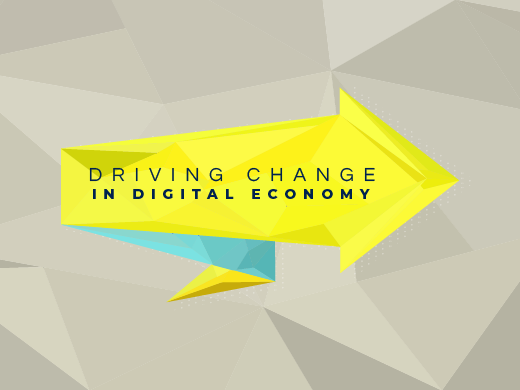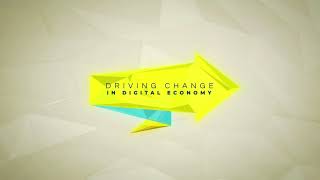Driving change in digital economy
Kursstart: 17. Januar 2024
Driving change in digital economy
Georg Macher, Omar Veledar, Stefan Vorbach (TU Graz)
Dieser Kurs ist Teil eines Microcredentials auf microcredentials.at
Wissenschaftliche Einordnung:
Kursstart: 17. Januar 2024
Driving change in digital economy
Georg Macher, Omar Veledar, Stefan Vorbach (TU Graz)
Dieser Kurs ist Teil eines Microcredentials auf microcredentials.at
-
Umfang: 9 Lektionen
-
Aufwand: 3 Stunden/Woche
-
Teilnehmende aktuell: 226
-
Lizenz: CC BY-SA 4.0
-
Kursstart: 17. Januar 2024
-
Kursende: -
-
Status aktuell: Laufender Kurs
-
Verfügbare Sprachen:
Trailer
Details zum Kurs
Inhaltsübersicht
Allgemeine Informationen zum Kurs
Willkommen bei "Driving Change in the Digital Economy". Dieser Kurs umfasst neun Lektionen, die Ihnen einen Einblick in die dynamische Landschaft der digitalen Wirtschaft geben. In diesem Kurs erwerben Sie die wesentlichen Kenntnisse und Fähigkeiten, die Sie in der sich wandelnden digitalen Welt benötigen.
In der Zeit der digitalen Transformation bietet dieser Kurs eine ganzheitliche Einführung in den Erfolg in der digitalen Wirtschaft. In neun miteinander verwobenen Einheiten erhalten Sie Einblicke in die wichtigsten Aspekte von Innovation, Datenanalyse, Technologie und Geschäftsmodellentwicklung. Jede Einheit bietet eine einzigartige Perspektive und liefert praktische Werkzeuge für die Navigation.
Kursinhalt
Lektion 1: Einführung in die digitale Wirtschaft
Verschaffen Sie sich ein grundlegendes Verständnis der digitalen Wirtschaft, indem Sie die grundlegenden Begriffe und Konzepte, die dieser dynamischen Landschaft zugrunde liegen, entschlüsseln.
Lektion 2: Innovationsstrategie
Entdecken Sie die Kunst der Innovationsstrategie und lernen Sie, wie Sie verschiedene Rahmenwerke für zielgerichtete Innovationen einsetzen, die auf datengestützten Entscheidungen beruhen.
Lektion 3: Innovationsbestrebungen und Veränderungsmanagement
Tauchen Sie ein in die Themen Innovationsambitionen und Veränderungsmanagement und helfen Sie Organisationen, die Kluft zwischen ihrem aktuellen Zustand und ihren ehrgeizigen Innovationszielen zu überbrücken.
Lektion 4: Grundlagen der Datenanalyse
Verstehen Sie die Grundlagen der Datenanalyse, erforschen Sie die Datengenerierung, die Datennutzung und das Aufdecken von Geschäftsmöglichkeiten mit Daten.
Lektion 5: Der Stapel digitaler Technologien
Lernen Sie den Stack der digitalen Technologien kennen und verstehen Sie die konzeptionellen Grundlagen der Digitalisierungstechnologien, von der physischen Welt bis zur Cloud.
Lektion 6: Minimales lebensfähiges Produkt (MVP)
Lernen Sie, wie man ein Minimum Viable Product erstellt, das nicht nur die Kundenbedürfnisse erfüllt, sondern auch eine starke Kundenbeziehung fördert.
Lektion 7: Wertangebot und Geschäftsmodellinnovation
Gewinnen Sie einen tiefgehenden Einblick in das Wertangebot und die Innovation von Geschäftsmodellen, angereichert mit praktischen Beispielen, die Ihr Verständnis vertiefen.
Lektion 8: Auf dem Weg zur Industrialisierung der Technologien
Entdecken Sie die wichtigsten Konzepte und Best Practices für den Übergang von der ersten MVP-Phase zu einem vollständig realisierten Produkt.
Lektion 9: Technologiegesteuerte Unternehmen und Geschäftsmodellinnovation
Erforschen Sie die symbiotische Beziehung zwischen Technologie und Wirtschaft und entdecken Sie das Potenzial für bahnbrechende Geschäftsmodellinnovationen.
Jede Einheit ist darauf ausgerichtet, Ihnen wertvolle Einblicke und praktische Werkzeuge zu vermitteln. So werden Sie in einer Welt, in der digitale Innovation der Schlüssel zum Erfolg ist, befähigt. Melden Sie sich noch heute an und starten Sie in die digitale Transformation!
Vorkenntnisse
Keine speziellen Vorkenntnisse notwendig
Kursablauf
Der Kurs kann in 3 Wochen absolviert werden. Pro Woche werden 3 Lektionen freigeschaltet. Der Kurs ist Teil eines Microcredential-Angebots der TU Graz. Details dazu finden Sie demnächst auf https://www.tugraz.at/studium/studienangebot/universitaere-weiterbildung/gruene-digitale-transformation/digital-economy-digital-green-economy
Zertifikat
Für die aktive Teilnahme am Kurs erfolgt bei Abschluss die Ausstellung eines automatisierten Zertifikats, welches Ihren Benutzernamen, den Kursnamen und die abgeschlossenen Lektionen beinhalten. Es wird darauf hingewiesen, dass es sich nur um eine Bestätigung handelt, die aussagt, dass die Benutzerin oder der Benutzer zumindest 75% der gestellten Selbstüberprüfungsfragen richtig beantwortet hat.
Lizenz
Dieses Werk ist lizenziert unter Creative Commons - gleiche Weitergabe 4.0 International (CC BY-SA 4.0) TU Graz
Zusätzliche Inhalte
Weiterführende Informationen
www.LeadTransformation.tugraz.at
www.EMBATwin.tugraz.at
www.EMBALead.tugraz.at
Kursleitung
Georg Macher, Omar Veledar, Stefan Vorbach (TU Graz)
Dr. techn. Georg Macher, MBA hat einen Ph.D. in Elektronik und einen MSc. in Telematik von der Technischen Universität Graz. Seit 2018 ist er am Institut für Technische Informatik tätig, wo er als Senior Scientist die Forschungsgruppe Industrial Informatics leitet. Seine Forschungsexpertise umfasst System- und Software-Engineering, Softwaretechnologie, Prozessverbesserung, funktionale Sicherheit und Cyber-Security Engineering. Im Jahr 2021 schloss Dr. Macher seinen MBA an der WU Executive Academy ab und spezialisierte sich auf Innovation und Digitalisierung in der Automobilindustrie. Mit über 145 Publikationen und einer bedeutenden Präsenz in verschiedenen Programmkomitees und industriellen Arbeitsgruppen ist er auch als Berater, Coach und Trainer in der Industrie tätig, wobei er sich vor allem auf die Zuverlässigkeitstechnik und den Automobilsektor konzentriert.
Omar Veledar ist ein Innovations- und F&E-Projektmanager, der sich auf die Schaffung von Auswirkungen und die nachhaltige Anwendung von technischen Lösungen in den Bereichen IoT, Fahrzeugsteuerung, Mobilität, KI usw. konzentriert. Sein technischer Hintergrund liegt im Bereich der Kfz-Instrumentierung (seit 2011) und der wissenschaftlichen Forschung auf dem Gebiet der angewandten Physik mit einer Ausbildung in Elektronikdesign. Er erhielt 2002 einen BEng (Hons) und 2007 einen PhD von der University of Northumbria in Newcastle (UK). Er hat ein MBA-Studium an der Wirtschaftsuniversität Wien (AT) abgeschlossen, mit einer Spezialisierung in Projektmanagement im Jahr 2019. Er ist mit der Beschaffung, dem Aufbau und der Koordinierung von F&E-Programmen mit Schwerpunkt auf nachhaltigem Innovationsmanagement betraut.
Univ.-Prof. Dipl.-Ing. Dr.techn. Stefan Vorbach studierte Wirtschaftsingenieurwesen-Maschinenbau an der Technischen Universität Graz und Umweltschutztechnik an der Technischen Universität in München. Er promovierte 1999 an der Technischen Universität Graz und habilitierte sich 2005 an der Karl-Franzens-Universität Graz. Seit 2010 ist er Vorstand des Instituts für Unternehmungsführung und Organisation und seit 2019 Vizerektor für Lehre an der Technischen Universität Graz. Sein Interesse gilt u.a. den Themen Innovations- und Technologiemanagement, Entre- und Intrapreneurship und Fragen der Organisation.
Partner:innen
Beevadoo e.U.
-

Technische Universität Graz
-

microcredentials.at
-

Beevadoo

